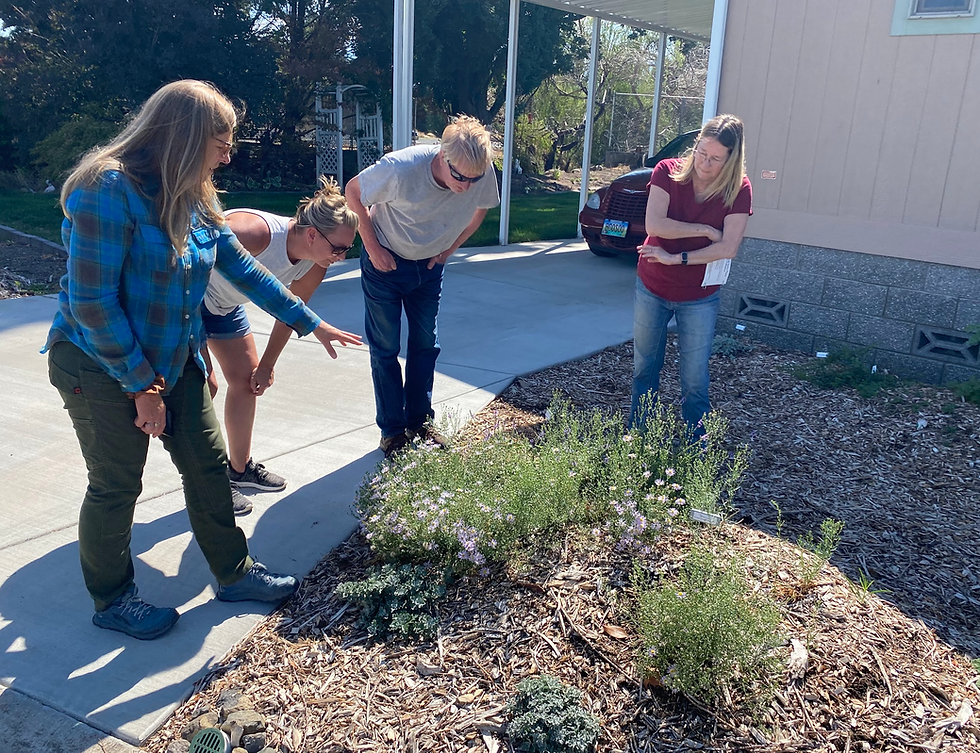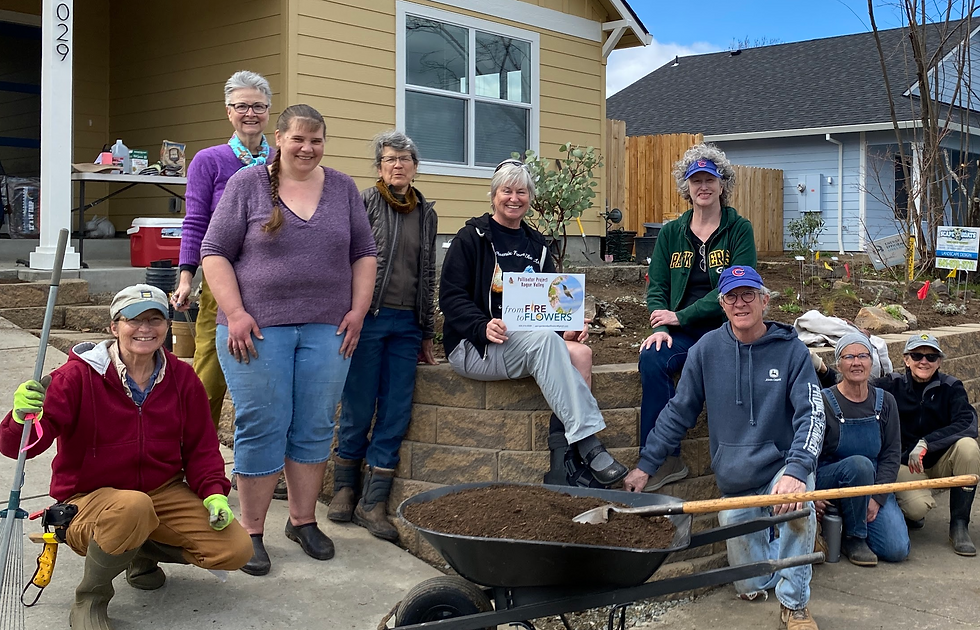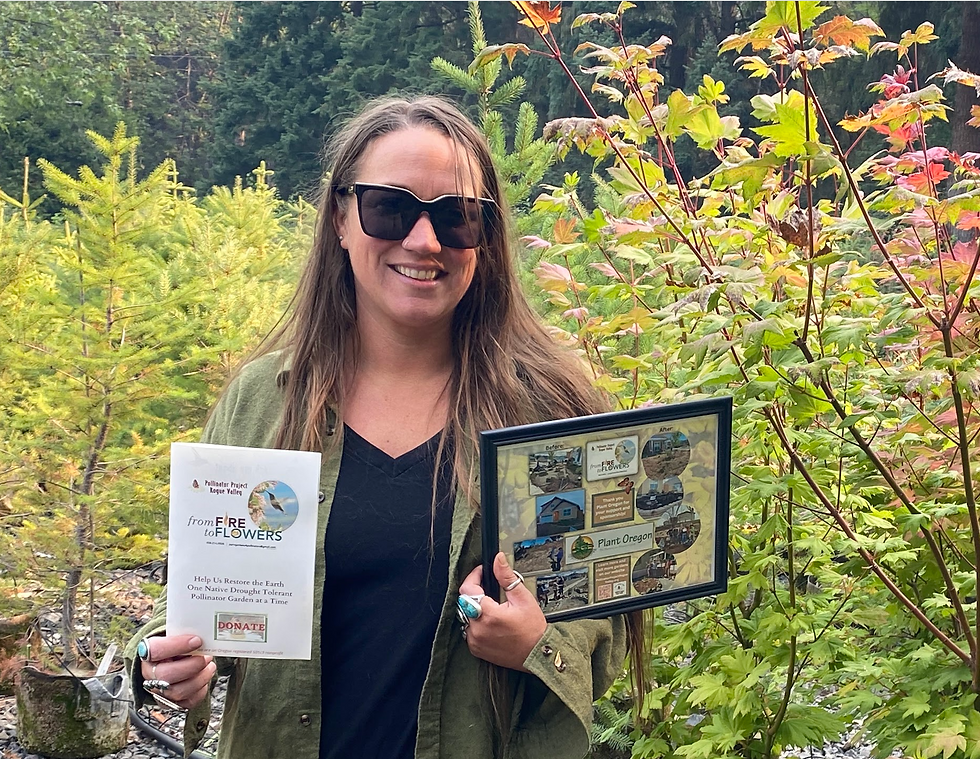From Fire to Flowers Pollinator Garden Program: Restoring Community and the Ecology, Part 3
- Pollinator Project RV
- Feb 11, 2024
- 7 min read
Updated: Feb 12, 2024
Tiina Beaver and Vanessa Henson showing Steve and Lisa all the tiny bees on the Hall's Aster, 3 1/2 months after the garden was planted, September 2023.
Click the photo to see our photo album of the garden's transformation.
by Erin Keller, PPRV Pollinteer
February 2024
“It’s people that make the program happen, and it’s people that the program is for. Ultimately, the program benefits all of us.” Kristina Lefever, President, Pollinator Project Rogue Valley
“As we work to heal the earth, the earth heals us.” Robin Wall-Kimmerer
Sometimes it all comes together. All of it. Sometimes the right people are in the right place, at the right time, and they create inspiration for each other – and the result is something that none of them could have imagined without the others. That is the From Fire to Flowers Pollinator Garden (FFFPG) program in a nutshell.
It isn’t all happy or easy, though. Not at all. The FFFPG program was born from the traumatic losses created by the Almeda fire of 2020. While many of us were looking for ways to be helpful, Pollinator Project Rogue Valley (PPRV) was developing a plan to help not only those who lost their homes, but ultimately to help all of us who depend on the native pollinators that are critical to our local ecosystem.

During the past months, I’ve written two articles about the FFFPG program. (Please click to read Part 1 and Part 2.) The process has been awe-inspiring, and made me want to know more about the people who created and sustain the program, so I arranged to speak with several of them, and hope to share a bit of those conversations here. What came through is that each of them operates from their hearts, in their own ways. Each of them believes in the healing power of nature, beauty, listening and community. Importantly, each one is motivated to, and believes that we can, make a positive impact on our ecosystem.
You may already know that the FFFPG program does good for so many beings - native plants, pollinators, fire-impacted homeowners, students, volunteers, community members and the ecosystem. So, it makes sense that it takes special people to make it all happen. Finding special people is a gift that President Kristina Lefever knows she has, and that she is consciously developing. Kristina has a gift for listening to potential volunteers with her heart, and letting it guide her as she finds what fits between the individual, and the mission of PPRV. She is aware that when she approaches conversations with volunteers in this way, she is seeking to attract and retain truly dedicated individuals who know that they are making a positive difference.

Such was the case when PPRV Vice President and FFFPG team member, Arti Kirch, came to visit for the first time. As Arti describes that first meeting, she was new to the Rogue Valley, having moved here during the lock-down phase of the pandemic, and she was eager to make connections with like-minded people. Arti had spent much of the previous decade in California, immersed in propagating Mediterranean-climate plants, as well as edible garden starts, and educating the public about these processes. After hours in conversation with Kristina, Arti left as a dedicated PPRV “Pollinteer” and a soon-to-be Board member.
Sometimes lovingly referred to as PPRV’s native plant geek, Arti spends a lot of time in the propagation nursery that partially supplies plants for FFFPG gardens. Arti’s reverence for plants runs deep. She states, “plants are practically the only beings capable of making their own food, and everything else depends on them - pollinators, herbivores and every other being.” As such, she finds great value in being part of, and supporting, the FFFPG program.

Vanessa Henson and Tiina Beaver are the FFFPG program coordinators. Collaboratively, they ensure that the gardens happen, including making initial contact with the garden recipients (called “gardeners”), sending, receiving and reviewing the application, scheduling the initial meeting, creating a garden design and presenting it to gardeners, setting dates for sheet mulching and garden install, ordering materials, organizing volunteers, and overseeing the installations. Both of them combine compassionate, empathetic listening with technical know-how, to create a richly rewarding process for gardeners, as well as volunteers.

FFFPG Garden Coordinator, Vanessa Henson, is a life-long resident of the Rogue Valley and very much invested in her community. On the day of the Almeda fire, she and her husband were successful in their fight to save their newly-purchased home. However, her husband was not able to save their friend’s home, despite his significant effort and risk to his safety. The next morning, their excavation company, C3 Enterprise, was the first on site for the clean up, employing local young people, whose families had just lost their homes, giving them a way to begin to rebuild.
Vanessa’s family continues to support their community in meaningful ways. Dedication to her community and access to excavation equipment are only part of what Vanessa brings to the FFFPG team. Vanessa has an intuitive sense about how to connect with people who have recently lost so much. She muses that this may be, in part, because she experienced some of the same events and losses, or it may just be her way of being. In any case, Vanessa is keenly aware of the importance of listening, as a crucial first step in the process, to help gardeners feel supported and to learn what each gardener's hopes, capabilities and priorities are for their new pollinator garden.
Tiina Beaver is the FFFPG Program Coordinator. Tiina has her own remarkable set of gifts, combining expertise as a landscape designer with the healing modalities of reiki and forest bathing. Tiina brings an understanding of the impacts of trauma, from experiences in her own life, as well as the lives of some of her family members. She is transforming the pain of these experiences into a desire to provide healing for others. Tiina states that at this time, her three life-long interests are coming together: garden design, the healing power of nature, and our bodies’ innate ability to heal.

As Program Coordinator, Tiina quietly goes about creating a garden plan that incorporates the wishes and needs of the gardener, as well as the site’s own requirements. She believes this will increase the gardener's interest in being in the garden and receiving the healing benefits. Tiina also has the knowledge to work with the needs of the plants, its growth habits, size and shape, bloom time, and its benefit to pollinators and the ecosystem. It is no wonder that gardeners have been so pleased with their gardens.
Another person helping to increase the impact of the FFFPG program is Dr. Chhaya Werner, plant ecologist and professor of environmental science at SOU. Dr. Werner is interested in the process of regeneration following disturbances, such as fire or flooding. The environmental losses of the Almeda fire provides not only an opportunity for her students to study regeneration, but also to lend a hand to people who lost their homes, and to help the environment. Dr. Werner’s students come on site to learn about the soil, sun/shade, irrigation requirements and more, observe communication between the Garden Coordinators and gardeners, and then create their own proposed garden design. Following a discussion about the designs in relation to the site, students “get dirty”with sheet mulching and/or garden installation activities. Dr. Werner notes that fire provides the perfect opportunity for native plants to regenerate the landscape. Since the open land also is an opportunity for invasives, even small projects like the FFFPG gardens help ensure that natives win out, at least part of the time. She notes that she is excited to watch how the gardens will look in a few years as they fill in.

As you might imagine, it takes many people to complete each garden, and everyone of them is so important and appreciated. Pollinteers provide physical labor to make the gardens happen, as well as the technical skills, such as creating the Garden Guide provided to each gardener. Kristina had this to say about the team, “Just what would we do without them!? Everyone is just amazing!” She notes that all together, PPRV works with about 40 Pollinteers, some who volunteer weekly, and others only a couple times per year, but it all adds up, and it all matters.
Pollinteer Sue Fthenakis described her FFFPG experience this way, “I had a wonderful time working with PPRV as we installed a garden in Maureen’s front yard. It was really rewarding to be part of a team working together to accomplish such a good project. There was a well prepared plan, the materials and tools were all on-site, and everyone cooperated beautifully. By the end of the day, the yard was transformed from a flat, weedy, unappealing space to a contoured, interesting landscape, populated with pollinator friendly plants ready to blossom into a beautiful space as the things get established. I came home in a really good mood that day.”
FFFPG gardens are only possible with gifts from caring and supportive partners, such as Koenig Investment Advisory and Plant Oregon. LorrieAnne Miller of Koenig Investment Advisory had this to say about supporting the FFFPG program, “Koenig Investment Advisory is proud to support PPRV and its dedicated volunteers, especially for the From Fire to Flowers Pollinator Garden program. We’ve been impressed with this organization's ability to reach out to many sectors of the community, from childhood education programs to fun events with Unete and helping fire survivors establish healthy gardens in their rebuilt homes. PPRV not only cares about planting native plants to support the environment, but also to support the people who live within these environments. This is a great group of folks to work with in the common cause of making the Rogue Valley a nurturing place to live.”
Jenny of Plant Oregon shared these important words, “Supporting Pollinator Project Rogue Valley is crucial for the well-being of our environment and the preservation of pollinators. Their efforts in educating the community and nurturing pollinators are truly commendable. Together, we can make a positive impact on our planet.”
Feeling inspired to be a part of or to support this important work? There are multiple ways and opportunities! Every donation, large or small, makes a difference! Pollinteers are always needed, whether working in the gardens, or behind the scenes. Visit our website to learn more, see photos of garden transformations, and find contact information to Bee Involved.
We depend on community support! Your tax-deductible donation helps us get the work done!
Consider a monthly donation!
Make a donation online or mail a check to 312 N. Main St, Suite B, Phoenix, OR 97535






























Hozzászólások